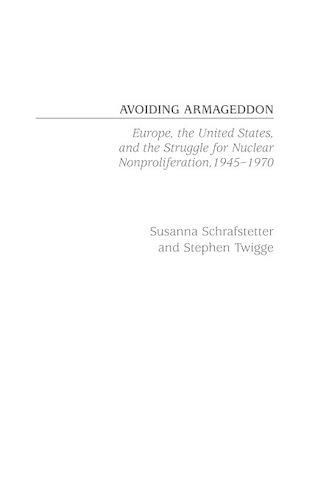
Avoiding Armageddon: Europe, the United States, and the Struggle for Nuclear Non-Proliferation, 1945-1970
(Hardback)
Publishing Details
Avoiding Armageddon: Europe, the United States, and the Struggle for Nuclear Non-Proliferation, 1945-1970
By (Author) Susanna Schrafstetter
By (author) Stephen Twigge
Bloomsbury Publishing PLC
Praeger Publishers Inc
30th April 2004
United States
Classifications
General
Non Fiction
327.1747
Physical Properties
Hardback
256
Description
Traces the struggle to halt the nuclear arms race and prevent the annihilation of humanity, from Hiroshima to the conclusion of the Nuclear Non-Proliferation Treaty in 1968 From the destruction of Hiroshima to the conclusion of the Nuclear Non-Proliferation Treaty in 1968, the international community struggled to halt the nuclear arms race and to prevent the annihilation of humanity. This study offers an accessible and authoritative account of European policy in this critical dimension of world politics. How much influence did Europeans exert in Washington Why were European objectives often at variance with US expectations To what extent did differing national agendas on non-proliferation cause friction within the Western Alliance Schrafstetter and Twigge examine five initiatives designed to prevent or restrain the nuclear arms race: the international option, the commercial option, the moral option, the multilateral option, and the legal option. Their conclusions show the extent to which non-proliferation policy dominated European politics and the transatlantic relationship. The international option focuses on early UN plans for international control of atomic energy (1946-48). The commercial option assesses the influence of Eisenhower's Atoms for Peace proposal of 1953 and the impact of civil nuclear power. The moral option charts international attempts to outlaw the testing of nuclear weapons, resulting in the 1963 Partial Test Ban Treaty. The multilateral option discusses the role of collective nuclear forces in addressing West German demands for nuclear equality within NATO. The legal option explores British, French, and West German attitudes to nuclear disarmament and charts the international drive to stop the spread of nuclear weapons culminating in the signing of the Non-Proliferation Treaty in 1968. Throughout the analysis, attention is focused on the role of the European powers and their influence on both Washington and Moscow. Addresses the important issue of nuclear non-proliferation Adds a western European perspective on an issue usually dealt with only in terms of U.S.-Soviet relations
Reviews
As Americans and Europeans debate global priorities and nuclear terror, this studied history of trans-Atlantic nuclear relations takes on added import. Schrafstetter and Twigge present a sophisticated and readable portrayal of the varied motives of the major powers, the realities of power and influence, and occasionally principled policymaking. . . . Recommended. Lower-division undergraduates and beyond. * Choice *
[A] mind expanding experience. Susanna Schrafstetter and Stephen Twigge have performed a needed service in analyzing the contributions made by Great Britian, France, and the Federal Republic of Germany (FRG) in the struggle to control the bomb. . . . Avoiding Armageddon masterfully transforms the Europeans from merely bit players lurking in the wings of the Cold War to the center stage of world politics. * Journal of Cold War Studies *
Author Bio
SUSANNA SCHRAFSTETTER is a Lecturer in History at the University of Glamorgan, Wales. STEPHEN TWIGGE is an Honorary Research Fellow in the Department of Science and Technology Studies, University College London.
